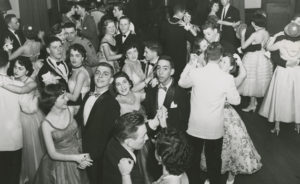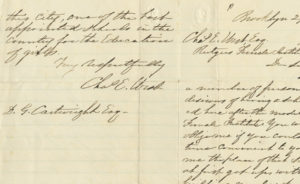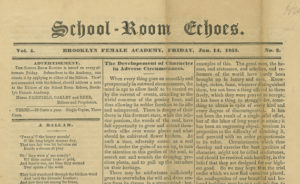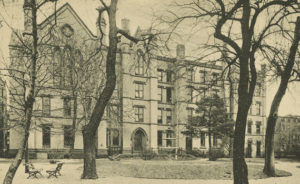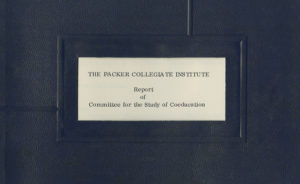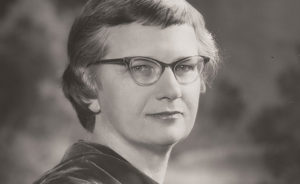The Packer Collegiate Institute: A Story of Education in Brooklyn
Testimonials
Lia DiBitonto (Class of 2017)
I opened up box 383, and took out a stack of tattered letters and postcards. It was our first day in the archives, and a pile of unchartered text lay before me. Deciphering the fluid script, I figured out that the letters were written in the 1920s by a one-time Packer teacher, Alice Van Vliet, throughout her travels in Europe. Each time I returned to the letters, more questions would arise: “What was Alice doing in Europe?” “Was she trying to escape the gender norms of 1920’s America?”
Very few historians have published on the topic of 1920’s female travel writing, making my research that much harder, but also that much more exhilarating. Soon, this woman who was once just a signature on the bottom of a postcard emerged as a detailed and complex character: one whose evolving identity I felt I had the responsibility to discover. As I grappled with putting Alice’s letters into the greater historical context of the time period, I noticed two sides to her writing. On one hand, her letter’s suggest that she felt the need to play a submissive role in her travels due to the gender norms of the era. On the other hand, Alice’s writing is filled with thrills, subtle romances, and rebellions, alluding to the idea that while abroad, she rejected the restraints of America’s domestic sphere. These apparent contradictions in her letters reflect the shifting ideas around women’s role in the workplace and the home in the 1920s, and force us to reassess the idealized notion that the time period was a transformative time for educated, white women.
Uncovering the differences, some nuanced, some drastic, between my Brooklyn and Alice’s has led me to not only appreciate my community, but also to think critically about how it became what it is today. While it was pretty nerve-racking entering the class without knowing what I would be researching, the independent nature of the course allowed me to find archival sources that truly resonated with me and learn how to make meaning of documents that had never been studied in depth before.
Victor Akujobi (Class of 2017)
Last year, I was grateful to be placed in the AT Archival Research course at The Packer Collegiate Institute. Using the comprehensive archives stored at the Brooklyn Historical Society, students in this class are tasked with making an assertion about a period of time and supporting this claim with evidence and investigating historical implications. Personally, I enrolled in the class expecting my GPA to dip as a result; but I was undaunted by the prospect of taking such a difficult class. Rather, the opportunity to work hands-on with archival material, make observations about these pieces, and then share my work with my peers in a professional setting is something that I had never done before. Through the coursework, and the trust instilled in me by Dr. Strauss, my teacher, I gained a sense of appreciation for the course that transcended the confines of a standard course and student-teacher relationship; I felt truly proud of the work I had done over the long course of the year, and took pride in the work my peers had done as if it was my own. I began to approach all matters of history as a scholar, considering the implications, scale and point of view of events in my work. This course was the pinnacle of my academic experience, as it molded me into a true student with the ability to compromise, understand and think critically, and I definitely will recommend it until the end of time.
Lexa Krebs, Class of 2017
Last year in an Advanced Topics Archival Research course, I focused on child welfare in New York City in the late twentieth century. I started by researching organizations such as The Children’s Defense Fund and the history of its founder, Marian Wright Edelman. I then moved further into exploring the volatile political climate of the time and the problem of state education. I found strength in the interdisciplinary nature and complexity of my topic, which made me appreciate the nuance of history and, in turn, the power of learning about one topic in conjunction with another. I feel grateful to have had the opportunity to use the Brooklyn Historical Society’s “untouched” Packer Collection to examine my topic because I knew my conclusions couldn’t have been drawn by historians before. I was able to apply what I learned from the archives into a research project surrounding issues for which I feel passionate, such as human rights and social justice, all which made for a unique educational experience.
Delilah Righter, Class of 2017
Last year I took Packer’s new Advanced Topics class in archival research, where we were given access to hundreds of boxes of the school’s historical primary sources. It was a really unique experience to be a high school student doing such intense research—being trusted to handle important documents and artifacts, some of which dated back to the 1800s. It was both exciting and somewhat nerve-racking to delve into those initial boxes. No one else had looked at most of the archives in decades, as they’d been buried in storage for years before being transferred to BHS. There were times, I admit, that I felt overwhelmed by the level of independence that this type of research demanded, but it was also satisfying knowing how meaningful the work we were doing was.
Stepping into the BHS library, and settling down with a box, I immediately felt like I was traveling back in time. Being able to spend so much focused time with just a handful of archives was a very intimate experience. For my research project, I looked at some of Packer’s curriculum catalogues from the 1950s and ‘60s, along with editorials from Packer’s student publications from the ‘60s and ‘70s on issues pertaining to feminism and freedom of expression. After just a few visits to the library, I felt like I really knew the girls whose writing I had been picking apart and analyzing, and that’s what made the research, as difficult as it was at times, that much more interesting and exciting to conduct. By the end of the 9-month process, each of us felt so connected to our projects because they had become so personal. I remember a friend turning to me, right before we gave our final presentations in front of our friends, families, and teachers, and saying, “It’s like we’re finally giving birth to our babies after nurturing them for all these months.” And she was right. Revealing all of our hard work to the public, and showing them just how passionate we all had become about our own topics, was one of the most rewarding feelings I’ve ever experienced.
Jordan Allyn, Class of 2016
Last year, I dug into the Packer archive collection and found a buried treasure. I used an article from 1972 in the Packer Prism about reproductive rights activist Bill Baird’s speech on how to have safe sex. The story stood out to me and led me to research Baird’s work and influence. It became clear that, although he has dedicated his life to the reproductive rights movement, his name has been left out of the historical narrative. For the course, I researched the historical context of the article and analyzed the different sides of the women’s liberation movement, and interviewed Bill Baird about his current opinions on his role in the movement. The project allowed me to be a real historian and to tell a part of history that has never been told.
Ben Bienstock, Class of 2016
Being a part of Archives in its first year was a unique and wonderful experience. Developing a project from a germ of an idea gleaned from a few archival documents to a fully formed research paper and presentation over the course of an entire year was a meaningful and important process for me. It’s hard to overstate how much I learned—not only about history and research, but also about myself and my relationship to Packer. To be able, as a Packer senior, to read and research what Packer students in the 1970s thought about the school opened my eyes to a radically different understanding of the possibilities of history, high school, and my senior year experience.
